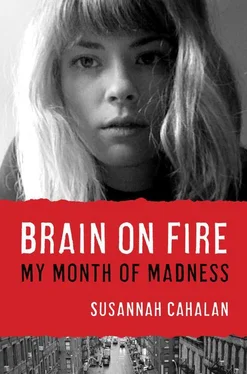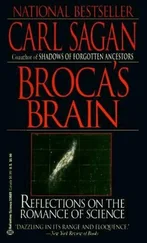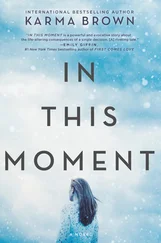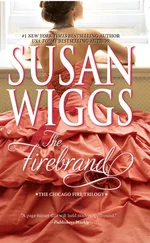“I can’t do this,” I shouted. “I don’t want to. Please don’t make me do this.”
“Come on!” he said, but stopped his cajoling when he sensed my anxiety. “It’s okay. I promise you’ll be okay. We’ll take it slow.”
I headed nervously down the mountain with Stephen following. Midway down, I picked up speed, feeling silly about my terror from moments before. Safe at the bottom a few minutes later, though, I recognized that this panic had been far more critical than just a fear of heights. Still, I said nothing further about it to Stephen.
Monday night, back at my mother’s house in New Jersey, I was still having trouble sleeping, but now instead of nervous, I felt nostalgic. I riffled through old clothes and discovered I finally fit into pants that I’d only been able to pull up to my midthigh since sophomore year in high school. I must be doing something right, I thought gleefully.
I would soon learn firsthand that this kind of illness often ebbs and flows, leaving the sufferer convinced that the worst is over, even when it’s only retreating for a moment before pouncing again.
CHAPTER 6
AMERICA’S MOST WANTED
The next Tuesday morning at work, my office phone rang. It was Steve. He seemed to have forgiven me for my recent absence and displays of ineptitude, or at least had decided to give me another shot: “I want you to interview John Walsh tomorrow morning when he comes in for a Fox News interview. He’s working on a new episode about drug-smuggling submarines that I think could be a fun page lead.”
“Sure,” I said, trying to muster up the enthusiasm that had once come so naturally. It did sound exciting to interview the host of America’s Most Wanted, but I couldn’t seem to focus. The first thing I needed to do was a clip search, so I called the Post ’s librarian, Liz. She is a researcher by day, Wiccan priestess by night. Inexplicably, instead of asking for a search, I requested a tarot reading.
“Come on by,” she said languidly.
Liz practiced modern witchcraft using candles, spells, and potions. She had recently been appointed Third Degree High Priestess, meaning she was able to teach the craft. She wore rows of pentacles and flowing Stevie Nicks–style clothes, and even donned a black cape in winter. She smelled of incense and patchouli and had drooping, trustworthy, puppy eyes. There was something attractive about her energy, and despite my innate skepticism of witchcraft and religion overall, I found myself wanting to believe.
“I need your help,” I said. “Things are not going well. Will you do a reading?”
“Hmmm,” she said, laying out a deck of tarot cards. “Hmmm.” She drew out each syllable. “So I see good things. Positive stuff. You’re going to have some sort of a job change. Something freelance outside the Post . Financially, I see good things for you.”
Waves of calm coursed through my system as I concentrated on her words. I had needed someone to tell me that I was going to be okay, that these odd setbacks were just blips on the radar of my life. In retrospect, Liz may not have been the right person to go to for this kind of reassurance.
“Oh, man. I feel all floaty,” Liz added.
“Yeah, me too.” I did.
When I returned to my desk, Angela looked depressed. A fellow Post reporter, our resident renaissance man who covered all sorts of beats for the paper, had passed away from melanoma. An e-mail was circulating throughout the newsroom, outlining the funeral arrangements for that Friday. He had been only fifty-three years old. It made me think of my own melanoma diagnosis, and for the rest of the day, even as I should have been researching John Walsh, I couldn’t force the sad news out of my mind.
The next morning, after another sleepless night, I used the few remaining moments I had to prepare for the interview to Google melanoma relapse rates instead. I was completely unprepared when 9:50 a.m. hit, but I headed out to meet Walsh in an empty office down the hall anyway, hoping I could just wing it. As I walked through the hallway, framed Post front pages began to close in on me, their headlines contracting and expanding.
BILL CHEATED ON ME!
SPACESHIP EXPLODES MIDAIR, ALL 7 DIE
DIANA DEAD
THE KINK AND I
CHILLARY
The pages were breathing visibly, inhaling and exhaling all around me. My perspective had narrowed, as if I were looking down the hallway through a viewfinder. The fluorescent lights flickered, and the walls tightened claustrophobically around me. As the walls caved in, the ceiling stretched sky-high until I felt as if I were in a cathedral. I put my hand to my chest to quell my racing heart and told myself to breathe. I wasn’t frightened; it felt more like the sterile rush of looking down from the window of a hundred-story skyscraper, knowing you won’t fall.
Finally I reached the office where Walsh was waiting for me. He still had the makeup on from his Fox News interview, and it had melted a bit under the bright lights of the studio.
“Hi, John, my name is Susannah Cahalan. I’m the Post reporter.”
As soon as I saw him, I started wondering, oddly, if Walsh was thinking right then about his murdered son, Adam, who had been abducted from a department store in 1981 and found decapitated later that year. My mind wandered through this macabre subject as I stood smiling blandly at him and his manicured publicist.
“Hello,” the publicist said, breaking my train of thought.
“Oh, hi! Yes. My name is Susannah Cahalan. I’m the reporter. The reporter on the story. You know, on the drug smuggling, drug smuggling—”
Walsh interrupted here. “Submarines, yes.”
“He only has five minutes, so we should probably get going,” the publicist said, a hint of annoyance evident in her tone.
“Many South American drug smugglers are making homemade submarines,” Walsh began. “Well, actually, they aren’t in fact submarines but submersible crafts that look like submarines.” I jotted notes: “Columbian” [sic], “homemade,” “track about ten a…” “Drug boats, we must stop boats…” I couldn’t follow what he was saying, so I mainly jotted down disassociated words to make it seem as if I was paying attention.
“It is very cunning.”
I laughed uproariously at this line, though I didn’t know then and still can’t figure out what about that word seemed so funny. The publicist shot me a puzzled look before announcing, “I’m sorry, I have to interrupt the interview. John needs to go.”
“I’ll walk you out,” I said with pressured enthusiasm and led them to the elevators. But as I walked, I could barely maintain my balance, bumping into the walls of the hallway, reaching for the door to open it for them but missing the handle by a solid foot.
“Thank you, thank you. I’m a huge fan, huge fan. HUGE fan,” I gushed, as we waited at the elevators.
Walsh smiled with kindness, possibly accustomed to this type of eccentric effusiveness that was in fact divorced from my typical interview style.
“It was a pleasure,” he said.
I still don’t know—and probably never will—what he really thought of the strange Post reporter, especially because the story never ran. This would be the last interview I conducted for seven months.
CHAPTER 7
ON THE ROAD AGAIN
Idon’t remember how I got home after the interview or how I filled the hours in the wake of yet another professional debacle, but after still another sleepless night—it had now been over a week since I’d slept fully—I headed to the office. It was a gorgeous early March morning, the sun was out, and the temperature was a crisp thirty degrees. I had walked through Times Square twice a day for six months, but today, once I hit the rows of billboards at its center I was accosted by its garish colors. I tried to look away, to shield myself from shock waves of pigment, but I couldn’t. The bright blue wedge of an Eclipse gum sign emitted electric swirls of aqua and made the hair on the back of my neck stand up. I could feel the colors vibrating in my toes. There seemed to be something exquisite about that rush; it was simultaneously enervating and thrilling. But the thrill lasted only a moment when, to my left, the moving scroll of “Welcomes you to Times Square” caught my attention and made me want to retch in the middle of the street. M&M’s on an animated billboard to my left pirouetted before me, forging a massive migraine in my temples. Helpless in the face of this onslaught, I covered my eyes with mittenless hands, stumbling up Forty-Eighth Street as if I had just gotten off a death-defying roller coaster, until I hit the newsroom, where the lights still felt bright but less aggressive.
Читать дальше












